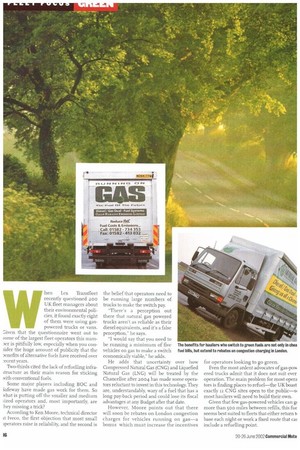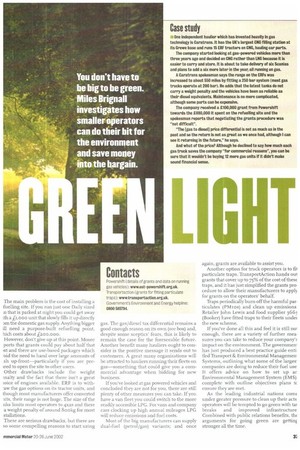WV hen Lex Transfleet recently questioned 200 UK fleet managers about
Page 36

Page 37

If you've noticed an error in this article please click here to report it so we can fix it.
their environmental policies, it found exactly eight of them were using gaspowered trucks or vans. ;iven that the questionnaire went out to some of the largest fleet operators this num3er is pitifully low, especially when you con3ider the huge amount of publicity that the 3enefits of alternative fuels have received over recent years.
Two-thirds cited the lack of refuelling infra;tructure as their main reason for sticking with conventional fuels.
Some major players including BOC and iafeway have made gas work for them. So what is putting off the smaller and medium ;ized operators and, most importantly, are hey missing a trick?
According to Ken Moore, technical director it Iveco, the first objection that most small Terators raise is reliability, and the second is the belief that operators need to be running large numbers of trucks to make the switch pay.
"There's a perception out there that natural gas powered trucks aren't as reliable as their diesel equivalents, and it's a false perception," he says.
"I would say that you need to be running a minimum of five vehicles on gas to make a switch economically viable," he adds.
He adds that uncertainty over how Compressed Natural Gas {CNC) and Liquefied Natural Gas (LNG) will be treated by the Chancellor after 2004 has made some operators reluctant to invest in this technology. They are, understandably, wary of a fuel that has a long pay-back period and could lose its fiscal advantages at any Budget after that date.
However, Moore points out that there will soon be rebates on London congestion charges for vehicles running on gas—a bonus which must increase the incentives for operators looking to go green.
Even the most ardent advocates of gas-poN4 ered trucks admit that it does not suit ever operation. The main problem for most opera tors is finding places to refuel—the UK boast exactly ii CNG sites open to the public—si most hauliers will need to build their own.
Given that few gas-powered vehicles can gi more than 500 miles between refills, this fue seems best suited to fleets that either return ti base each night or work a fixed route that cai include a refuelling point.
The main problem is the cost of installing a fuelling site. If you run just one Daily sized n that is parked at night you could get away Lth a D,000 unit that slowly fills it up directly am the domestic gas supply. Anything bigger ill need a purpose-built refuelling point, Eiich costs about f2oo, 000.
However, don't give up at this point. Moore ports that grants could pay about half that ist and there are use-based packages which .oid the need to hand over large amounts of .sh up-front—particularly if you are pretrod to open the site to other users.
Other drawbacks include the weight 1.12.1.ty and the fact that there isn't a great ioice of engines available. ERF is to with.aw the gas options on its tractor units, and though most manufacturers offer converted Ms, their range is not huge. The size of the nks limits most operators to 4x2s and there a weight penalty of around 8o okg for most stallations.
These are serious drawbacks, but there are so some compelling reasons to start using
gas. The gas/diesel tax differential remains a good enough reason on its own (see box) and, despite some sceptics' fears, this is likely to remain the case for the foreseeable future. Another benefit many hauliers ought to consider is the positive message it sends out to customers. A great many organisations will be attracted to hauliers running their fleets on gas—something that could give you a commercial advantage when bidding for new business.
If you've looked at gas powered vehicles and concluded they are not for you, there are still plenty of other measures you can take. If you have a van fleet you could switch to the more readily accessible LPG. For vans and company cars clocking up high annual mileages LPG will reduce emissions and fuel costs.
Most of the big manufacturers can supply dual-fuel (petrol/gas) variants; and once again, grants are available to assist you.
Another option for truck operators is to fit particulate traps. TransportAction hands out grants that cover up to 75% of the cost of these traps, and it has just simplified the grants pro. cedure to allow their manufacturers to appl3. for grants on the operators' behalf.
Traps periodically burn off the harmful par. ticulates IP Mms) and clean up emissions Retailer John Lewis and food supplier 366] (Booker) have fitted traps to their fleets undeJ the new scheme.
If you've done all this and feel it is still not enough, there are a variety of further mea. sures you can take to reduce your company's impact on the environment. The governmen. has just produced a best practice guide enti. fled Trans port IFE Environmental Managemen. Systems, outlining what some of the larges. companies are doing to reduce their fuel use It offers advice on how to set up ar Environmental Management System (EMS) complete with outline objectives plans tr ensure they are met.
As the leading industrial nations comm under greater pressure to clean up their acts operators will be tempted to go green with ta.) breaks and improved infrastructure Combined with public relations benefits, thm arguments for going green are getting stronger all the time.
























































































































































